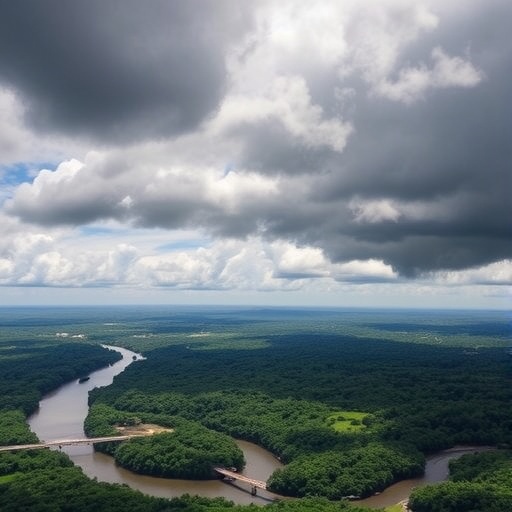The proposed construction of a highway deep within the heart of the Peruvian Amazon has sparked widespread concern among environmentalists, indigenous communities, and conservationists worldwide. This new infrastructure project threatens not only the rich biodiversity that the Amazon rainforest harbors but also the cultural and spiritual traditions of the indigenous tribes who call this vibrant ecosystem home. As the global community grapples with the ongoing climate crisis, the implications of such an endeavor are far-reaching and distressing.
The Peruvian Amazon, often regarded as the lungs of the planet, plays a critical role in regulating the Earth’s climate. It sequesters vast amounts of carbon dioxide and sustains an unparalleled diversity of flora and fauna. The introduction of a highway through this region could lead to significant habitat destruction, paving the way for deforestation, illegal logging, and increased human encroachment. Conservationists are alarmed not only by the immediate effects but also by the long-term impacts that could unravel decades of conservation efforts.
Indigenous communities in the Amazon have long relied on the forest for their livelihoods, embodying sustainable practices that have been in place for centuries. The proposed highway threatens to disrupt their way of life, making it challenging for them to access traditional hunting grounds, medicinal plants, and sacred sites. As the road invites settlers, farmers, and other industries, these communities could be marginalized further, leading to conflicts over land rights and resources. In essence, the highway represents not just a physical structure but a pathway to erosion of culture and identity for these vulnerable groups.
Supporters of the highway argue that it will promote economic growth, enhance connectivity, and spur development in the region. However, this utilitarian perspective overlooks the intrinsic value of the Amazon and the ecosystem services it provides. Deforestation caused by infrastructure development could lead to increased greenhouse gas emissions, further exacerbating climate change issues. Additionally, the introduction of roads often results in an influx of outsiders, who may not adhere to sustainable practices and pose threats to wildlife and the environment.
Moreover, the social costs of such development are manifold. Evidence suggests that increased access often leads to higher rates of violence, exploitation, and displacement among indigenous peoples. Many communities are already grappling with issues linked to their invisibility and marginalization in political arenas. The proposed highway project only heightens these imbalances, prompting international advocacy groups to call for immediate action and intervention to halt the plans.
An integral aspect of the environmental discourse surrounding this highway project revolves around the concept of ecological justice. Ecological justice emphasizes the right of all living beings to thrive within their natural habitats and highlights the need to respect Indigenous sovereignty. The construction of the highway could be viewed as a manifestation of ecological injustice, where the benefits accrue mainly to corporations and government revenues, while the burdens disproportionately fall on the shoulders of vulnerable populations.
Scientific research unequivocally supports the notion that protecting vital ecosystems like the Amazon can wield significant benefits against climate change. Preservation of the rainforest can mitigate flooding, control soil erosion, and maintain hydrological cycles. Dismantling such ecosystems for economic gain poses a false dichotomy; the true prosperity of humanity should be measured in harmony with nature rather than at the expense of it.
Thus, as major stakeholders engage in discussions about the future of this highway project, it is imperative that they recognize the intrinsic value of the Amazon Rainforest. It stands not only as one of the Earth’s last great wildernesses but also as a bastion of cultural diversity and indigenous resilience. Any development initiative must prioritize the preservation of both the environment and the rights of indigenous peoples, ensuring their voices are front and center in planning and implementation processes.
Global attention is increasingly focused on the implications of such infrastructure projects, and there is growing momentum towards adopting sustainable development goals that benefit both people and the planet. As activists rally to challenge the legitimacy of the highway construction, they are simultaneously raising awareness about larger issues of environmental governance that intersect with social justice and human rights.
In conclusion, while the allure of economic growth may captivate policymakers, the devastating consequences of the proposed highway in the Peruvian Amazon cannot be ignored. As environmental stewards, it is our collective responsibility to resist developments that threaten our most vulnerable ecosystems and communities. The stakes have never been higher, and the future of the Amazon—and of our planet—depends on the choices we make today.
Subject of Research: Environmental impact of proposed highway in the Peruvian Amazon and threats to indigenous communities.
Article Title: Correction: Proposed highway in the Peruvian Amazon threatens vulnerable indigenous communities and natural protected areas.
Article References:
Griffiths, B.M., Dimitrie, D., Schierbeek, E. et al. Correction: Proposed highway in the Peruvian Amazon threatens vulnerable indigenous communities and natural protected areas. Ambio (2025). https://doi.org/10.1007/s13280-025-02311-9
Image Credits: AI Generated
DOI:
Keywords: Amazon, highway construction, indigenous rights, environmental justice, climate change, deforestation, biodiversity, sustainable development.




